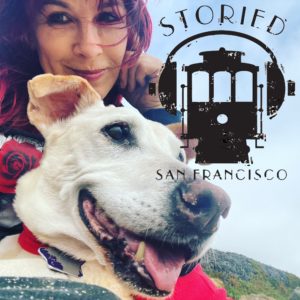Storied: San Francisco’s Pali Boucher Podcast
https://www.storiedsf.com/episodes/s3e30-part-1-rocket-dog-rescues-pali-boucher
Jasmine Blue’s Tails of the Dog Park
By Susan Dyer Reynolds
This month’s column was supposed to be about something entirely different, but a fateful meeting in front of Safeway changed that, as well as my life.
I saw a woman with a beautiful blue nose pit bull and stopped to say hello. “There’s a dog that looks just like him at San Francisco Animal Care and Control,” she said, “and they need to find him a foster home or he’s going to be put down.” Read rest of article | PDF version
Jasmine Blue’s Tails of the Dog Park”
Chapter 22: One flew over the Cooper’s nest
It is 3 p.m. and the break room at the Wag Hotel is filled with a motley crew of dogs waiting to make their television debut on KOFY TV 20’s Companion Dog Adoptions show, which airs Fridays at 10 p.m. and Saturdays at 7 p.m. on cable channel 13. Today the featured dogs come from Rocket Dog Rescue, and several volunteers, along with founder Pali Boucher, are appearing on camera to do the talking. Each has a unique story – classic cases of owner irresponsibility; some defining the words cold and cruel; others, as Pali explains, where the owner didn’t want to give up their pet but had no choice. Such is the case with a sweet little mix named Jasmine and her Lhasa apso friend, Princess. “This woman loves her dogs,” Pali explains, “but she is gravely ill and can no longer care for them.”
Interview with the San Francisco Chronicle
Pali Boucher, 43—a San Francisco native, founder of RocketDog Rescue and recipient of a 2001 Points of Light Award for outstanding volunteerism—is an inspiration to behold.
A onetime homeless spirit, burdened with the diseases of addiction and HIV, this human capsule of high energy found a better existence though recovery, the arts, the adoption of a dog she called Leadbelly and the formation of a nonprofit that saves canines. Woof!
Of “Run Lola Run”-image—with burgundy tresses, tats, split-pea green jeans and striped stockings—Boucher invited me into her colorful Bernal Heights human-size pooch house. There, with a volunteer named “Patty the Pooper Scooper” standing by amid many a woman’s barking best friend, Boucher bottle-fed the sweetest-ever 1-week-old abandoned pup as we yelped about her tumultuous life, made sane, if even more chaotic, through puppy love. Bow-wow!
Q: You haven’t always had a roof over your head.
A: No. I grew up with a mom who was on drugs, homeless and had a lot of problems with mental health. It was the ’60s. They called them communes, but we were really livin’ in the bushes. She died when I was 10. For a short time after, I was in a foster home, then with my dad. But soon I was back on the street.
 Q: This went on for how long?
Q: This went on for how long?
A: Until about eight years ago.
Q: What sparked the life change?
A: My dog Leadbelly.
Q: How did you meet him?
A: Back when the SPCA was a “kill shelter,” I would visit the animals once a week just to say hi to all the dogs. I loved the animals. But there was too much trauma in my life. I wasn’t looking to adopt. But there was this one hound dog always baying at the top of his lungs. I fell in love. So somehow, I got the money, faked an address and adopted him.
Q: How did you take care of Leadbelly?
A: It was a struggle. He was such a good guy. I was always worried about him. I’d get so worried that it set my mind in motion . . . I mean I was in and out of jail all the time. I narrowly dodged the bullet of losing my dog so many times that it just stressed me out too much, man. I had to make some changes. So I went into a drug program. While I was in recovery, Leadbelly stayed with a friend of mine. More than a year later, my subsidized housing came through, I was clean and sober and I got him back. All that time I never had a plan. I just got on the right path and did the day to day.
Q: What was life like for you then?
A: I went to City College and took a lot of art, ceramics, writing and photography classes—like full time. It felt really amazing to me. And I got really good at it. I even did a photographic documentary about the homeless camps I lived in called “Angels, Outlaws and Outcasts.”
Q: When and how did RocketDog Rescue come about?
A: I had been fostering for other animal rescue groups for years taking care of a lot of really difficult dogs. I’d get the crazy bruisers, which became a huge advantage for me because now there’s rarely a situation that I can’t handle. I mean, right now, I have one with no teeth and another who’s blind.
So a year ago—just after Leadbelly died—I wanted to go the next step and create my own nonprofit. My core group of about 10 friends became my board of directors and volunteers. RocketDog Rescue is a tribute to Leadbelly. He helped me learn how to take care of myself by taking care of him.
Q: And that’s why it’s important for you to save dogs’ lives now?
A: Absolutely. Leadbelly was a gift sent to me. And every step of the way it was my responsibility to follow through. Now, I want to devote my life to animals.
Q: So how does it work? Do people who can’t keep their dogs call you? Shelters?
A: I get tons of calls. But I can only take the dogs that are about to be killed at a shelter—that day. But I will help people place dogs into permanent homes.
Q: How many animals are under Rocket Dog’s refuge?
A: Currently we are fostering about 12 dogs. I’m the main foster home.
Q: How much dog food do you go through in a week?
A: Eighty pounds or about $70 worth. We feed them high-quality dog food.
Q: How many dogs have you saved?
A: In this past year, over 150.
Q: That’s amazing. How are you funded?
A: We run totally on donations; and none of us are ever paid. . . . We pay for spaying and neutering, vaccinations. Usually we do a lot more medically, or for dental work, than we should. I just had a dog come out of ear surgery. I took another dog to an eye specialist yesterday. What I do is sit out with a jar in the Castro or Noe Valley and collect money. I’m proud to do that.









